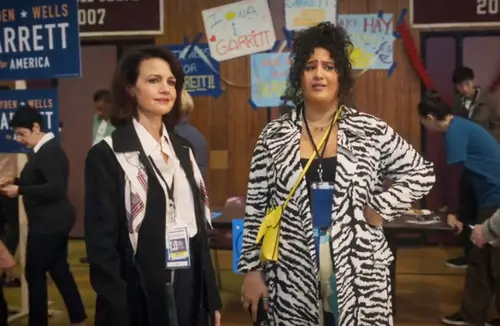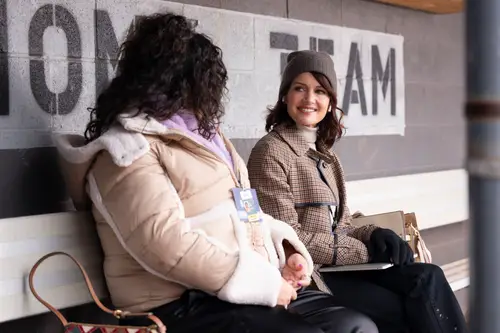Carlagugino Discussed Thegirlsonthebus
- melissa mel
- Apr 2, 2024
- 13 min read
Carla Gugino Discussed "Girls On The Bus," Working With Mike Flanagan, And The Impact Of "Spy Kids"
Carla Gugino takes us behind the scenes of some of her most famous roles, including working with Melissa Benoist in Girls on the Bus, her performances in The Fall of the
Carla Gugino has been at the center of some of my favorite movies and TV shows for as long as I can remember. If you quickly look at her IMDb, her credits really speak for themselves. From Spy Kids to Watchmen to being a formidable force in several of director and writer Mike Flanagan's horror projects, Carla has made her mark in countless genres and has created many memorable characters. Like, I still think about Olivia Crain from The Haunting of Hill House at least once a week.
Now, she's adding another compelling and strong female character to her resume with The Girls on the Bus. Inspired by Amy Chozick's book Chasing Hillary and her work as a journalist, the new series follows four female journalists who are on the campaign trail for an upcoming presidential election. Carla stars as Grace, a seasoned reporter who acts as a mentor and friend to Sadie, played by Melissa Benoist.
So to celebrate The Girls on the Bus, Carla sat down with me to discuss bringing this character to life. She shared how she joined the project, her favorite Grace scene in Episode 4, and more. And, we even found time to look back at some of her other iconic movie and TV roles.
Here's everything we chatted about:
There are spoilers ahead for The Girls on the Bus Episode 4, The Fall of the House of Usher, and more.
THEN: For the past few years, you've become an important part of Mike Flanagan's horror projects and are one of the best horror actors right now, in my opinion. How has it been building the relationship with Mike over the years since Gerald's Game in 2017?
That's very kind of you to say. I've never gravitated toward horror, per se. Meaning, I love any genre done well. So I'm in for all of it. But it was funny; I wasn't looking to do that, even though horror has obviously been an extremely successful genre for quite some time now. But what I was really compelled by was Mike's voice as a filmmaker, and with Gerald's Game, you know, it was always considered an un-adaptable book by Stephen King. Also, someone was attached to play the role before. So, from the moment that I spoke to Mike Flanagan to the moment we were filming Gerald's Game, it was literally two weeks.
So, to come on to that role in that project, in which I was chained to a bed within that period of time, was a real risk. And I thought, We're either going to do something really special here, or this is the end of my career. You know what I mean? There's no middle ground here. I'm so thankful that it was the former. But really, it was me talking to him when he was scouting in Atlanta via FaceTime. I didn't even know until later that it was sort of the movie would fall apart shortly thereafter if I couldn't have gone on board. His ideas, his clarity of vision, and the way into the story, it was just so precise. It made perfect sense to me. I aligned with it right away, and I thought, I really want to come help this person bring their vision to the screen.
So that was the beginning of that relationship with Mike. And since then, it has just continued to be a really easy and inspiring collaboration. I love to come in and help him tell his stories. He's such a wonderful writer and director, and editor. I also think because he has this sort of gentle perfectionism and he has a real strong sense of what he wants it to be, he is also therefore very collaborative. I always find the most confident people in their art are actually collaborative, you know? So I love what we get to create together. There's not one that I haven't REALLY enjoyed.
And then, more recently, certainly playing Verna in The Fall of the House of Usher was an opportunity I don't know if I'll ever get again. To do that combination of elements in one piece was something I will always thank Mike for.
NOW: The Girls on the Bus is inspired by Amy Chozick's Chasing Hillary and her real experience as a journalist. How did you first get involved in the project?
I think, initially, [executive producer] Greg Berlanti, who I worked with on Political Animals, reached out and said, "I have something that I think you might really like." And Melissa Benoist was attached as Sadie at that point. I knew Amy Chozick's book, so it all sort of came together. It was an exciting idea.
I think what really resonates with me, what sort of drew me to this show, was this idea of these four women who have come from different ideologies, different political beliefs, different backgrounds, different generations, and yet because they have been thrown into this journey together in very, very tight quarters, they are forced to connect, and through that connection, they actually find their way to each other, with all of those differences. To me, that's something I believe in the world. I was really compelled by that.
Also, I'm always so interested in understanding a world I don't know. The mechanics and the day-to-day of what goes on in what is a very formidable profession, but not a glamourous one of life on the bus. All of those things sounded like a really fun opportunity to come and play.
THEN: Your latest Mike Flanagan project,The Fall of the House of Usher, earned you your first major acting nomination for Best Actress in a Limited Series or TV Movie at the Critics' Choice Awards, which is wild to me because you've had so many memorable performances. How was it finally getting that recognition for a project that was so special?
I appreciate that you say that. I ran into Paul Giamatti, who I think is always amazing, and we've worked together; I ran into him at the Critics' Choice Awards, and he said, "Congratulations on your nomination," and I said, "You too." And I said, "You know, it's the first time I've ever been nominated here." And he was like, "No, no. What? There's no way. There's no way?" [Laughing] And I was like, "Yeah, there is." But I so appreciate it, and as we know, there are so many incredible people who don't ever get nominated. So, I appreciate that.
Do you still feel like, in terms of critical or awards season acclaim, horror as a genre is still almost looked down upon?
I think we're STILL in a world where horror still has this moment where people don't acknowledge it in that way.
I think about it a lot with The Haunting of Hill House, which is truthfully one of my favorite TV shows of all time. I think what you, Mike, and everyone who worked on that project were able to achieve was just astounding, but somehow it still didn't get over the awards season hurdle horror seems to face.
Wow, I appreciate you saying that. Hill House holds a VERY special place in my heart. I love that character so much, too.
How did Verna in The Fall of the House of Usher differ from playing Olivia Crain, older Jamie, etc., in other Mike Flanagan projects? Was she the most challenging?
I think that Verna was incredibly challenging because it was eight incarnations of not just eight different characters, but also eight incarnations of the same character. So I always wanted Verna to be right underneath the surface. The accents weren't written in initially. So, I would present ideas to Mike, and we would go, "Okay, this one sticks. Okay, this one, not." So that was also a really interesting process in that coming to life.
Just the fact that I got to play a patient who needs a heart transplant and then a chimpanzee. [Laughing] I mean, it was extraordinary.
NOW: Was Grace always the character you were going to play in The Girls on the Bus? Did she change at all between the casting process to filming?
It's interesting because I think Grace was initially written a little bit older than me. And it was imperative that she come from a different generation and has the institutional knowledge, and generation knowledge, of the profession, and also has been able to witness how drastically the profession of journalism has changed on a certain level. So, ultimately, there were some modifications made because I was a little bit younger, but I'm still a generation older than the other girls. You know, I think one of the things is that Grace has amazing one-liners and does not suffer fools.
One of the main things that Amy said about many of her mentors, and Grace isn't based on any specific one, was that the women were fierce, formidable journalists who influenced and mentored her, and there was also this incredibly generous heart underneath. That was something really important for me with Grace.
While she has strong opinions, there's a certain "been there, done that" kind of thing, but she still remains extremely curious. I think that's what made her a great journalist. I think that was an aspect I wanted to make sure we ensured that Grace had. I was really happy to have the support in that. That was maybe a part of her that sort of came together with me playing the part.
THEN: The Fall of the House of Usher was a huge success, and it came out during last year's SAG-AFTRA strike. How was it seeing audiences still fall in love with that show, even with little promo at the time?
I know, I was so sad about that. You know, it's always lovely to talk about projects, but with that one, I REALLY felt like, Oh, boy, there's so much to talk about. And I really wanted that opportunity for everybody involved. So I'm so glad that it was able to do well and get a certain amount of critical attention as well, in the midst of it coming out during the strikes.
NOW: Grace and Sadie have such a fun dynamic from the very first episode of The Girls on the Bus. How was it working so closely with Melissa Benoist?
Well, Melissa is just a total joy and such a professional. The four of us just connected, so immediately, that was just something you can't make happen; it's natural. So it was such a gift. And Melissa, you know, being the central point of this whole show, I think, always tonally, that person is setting the vibe on set. Melissa has a huge amount of humility and also beautiful playfulness, and real integrity. I think all of those things also come across in Sadie. She's also really funny.
What I love about Sadie and Grace's relationship is they are very good friends. And yet, Sadie's been sort of in awe of Grace as she was coming up. I think also because Melissa's character, Sadie, romanticizes the old version of journalism, you know, her obsession with Hunter S. Thompson and that relationship, I think Grace, though she is younger than that generation technically because she came from a journalistic family because her father was a journalist, everything like that, she definitely represents that for Sadie. So there is this sort of hierarchy there, and yet the truth of the matter is that they would confide in each other with everything, even if neither of them is sentimental.
It's a really fun relationship. Without giving too much away, when they start cracking a story together, that's also such a fun dynamic. And again, all the complexities that go along with that. It feels like we've set the stage, if there is a future to this show, also having a lot more ground to mine there.
THEN: Spy Kids came out 23 years ago and is still beloved by so many. You were also so young playing a wife and mother in the movie. How has it been to look back on that experience and see the impact the film still has?
It is so funny because I was 27—
Which honestly blows my mind, I have to tell you, because when I watched that movie as a kid, I never would've guessed you were that young.
Laughing] It was a really beautiful kind of double-edged sword because I love that movie so much. And the whole experience was incredible, and the movies continue. Like, every generation gets to watch it and love it so much. I love Ingrid Cortes. But it was funny because I was 10 years, AT LEAST, too young for the role because I was, like, a spy for 10 years and then somehow had children who were like nine and 11. [Laughing] So it was physically totally impossible.
Do you remember how you got cast as Ingrid?
So, I wasn't even on the initial casting lists. Ultimately, it's a longer story, but I was sitting with [director and writer] Robert Rodriguez; they'd already been shooting for two weeks. He was like, "I feel like I'm looking for a mother for my kids." We were talking about it, and I had auditioned for him and he said, "I think if we do our job right, no one will ever question it." And it's so funny like you said, nobody did. Antonio Banderas and I had worked together on a movie called Miami Rhapsody that David Frankel directed, so we also had a little bit of a history, which was really nice to come into it that way.
NOW: In The Girls on the Bus Episode 4, Grace and her daughter, Annie, have a heated discussion where Grace tells her, "The work is the first line of my obituary. You, my dear, are the last," which just knocked me over. How was it bringing a character to life that's juggling work and motherhood in such an honest way?
I'm so glad that you mentioned that scene because for me, I think if I had to pick, that's probably my favorite on-the-page scene of Grace's in the entire show because it's so shocking. We're not used to a parent saying that, certainly not a mother to a daughter. I think because Grace has lived in the shadow of her father her entire life, and that's been so defining for her, she actually means it to give her daughter freedom. To actually say your life is your own, you don't have to live in reaction to mine. But, you know, she does not mince words and I really feel such empathy for both of them in that scene. And the complexities of what it is to be, as you said, extremely successful in your profession and actually a really functional mother or parent. I also think that Grace did come from a different generation.
When I started acting, I was 13 going on 14, and I remember thinking, Oh, I can't have a life. Like, the only way to be successful with this is to be 100% focused on this. And a lot of things in my life were sacrificed for that. A lot of relationships and family. I mean, I think in terms of it wasn't until I was old enough to sort of go, Oh, wait, I have to take care of the really precious personal relationships in my life and my family as well. I do think that Grace is a really interesting example of a woman who is coming to terms with the consequences of her family life, in which she has always felt a bit like a failure, but her husband has really covered a lot of that ground for her. And now she's really looking at it straight in the face.
THEN: I know other female actors have talked about struggling to find roles that aren't just a wife, a mother, etc. After Spy Kids, did you find it difficult to make sure you didn't get stuck only being offered that one type of role, especially so early in your career?
What was so wild is that for many years after that, there were certain roles with men that were equal, or maybe a few years older than me at the time, like Brad Pitt or George Clooney or certain people who were in that age range, people would say, "Oh, but she's too old to play opposite them." And I was like, "No, no. I'm only 27!"
So, the good news for me is, you know, women sometimes are afraid, understandably so, to play mothers, and I think because I just did it so young, I got it out of the way. [Laughing] Like, I already messed that one up. But I'm so grateful for that whole experience.
NOW: Another fun dynamic in The Girls on the Bus we see early in the season is between Grace and Lola and how they come from two very different generations of journalism. How was it working with Natasha Behnam, who plays Lola?
I really love the relationship with Grace and Lola, and Natasha, I think, is just fantastic. She's very much of an old soul, too, in a young body. One of the qualities of people who have very strong opinions, I'm great with that, as long as you're also equally willing to have your opinion changed. I think that's Grace's perspective, which is she absolutely has a judgment about, like, the idea that there's journalism and TikTok together to her is like, These do not go together.
That being said, she's been a mentor to many people over time and she looks at this young woman, and it's like, This person actually has all the journalistic bones. She's smart. She's astute. Grace knows that's an instinct thing; you can't teach it. So as much as Grace is seemingly resistant initially, she's also like, You know what? I gotta give it to this girl. And realizing I think, I think there's a humility in Grace of, you know, you're never too old to become younger. That is a thing that has kept her on the trail for so long and has kept her hungry for so long is this innate curiosity, which I think is what opens up the relationship with Lola.
And finally, THEN: Have you ever taken a prop from a set after filming wrapped? If so, what have you taken?
Wow, that is a good question. I have over the years, grabbed a few things. Recently, in The Fall of the House of Usher, Mike Flanagan gave me the most exquisite antique book of The Raven by Edgar Allan Poe. That was really extraordinary. I have the handcuffs from Gerald's Game.
It's funny, it wasn't until later that I thought, Oh, it would be kind of cool to collect stuff. I've worked with Robert De Niro a couple of times in my career, which is such an awesome experience on both counts, but he's really great at collecting stuff, and I wish I had learned that earlier.
I always take a piece of clothing. I always have at least one outfit. I still have, from The Buccaneers, one of the exquisite corsests, which was made by CosProp in England. I do have an outfit, at least, from every character. Oh, and by the way, wigs. Like, from Elektra Luxx and Women In Trouble. So, I do have some blonde wigs, too.
Also, one thing I do really have fun with is whenever I play a character where there's been a doll of some sort made, I always make sure to grab it. Like, I have an Ingrid Cortes from Spy Kids, and I do have my character from Bly Manor. I have Sally Jupiter [from Watchmen], too. Those are fun and those have become a little collection.























Comments